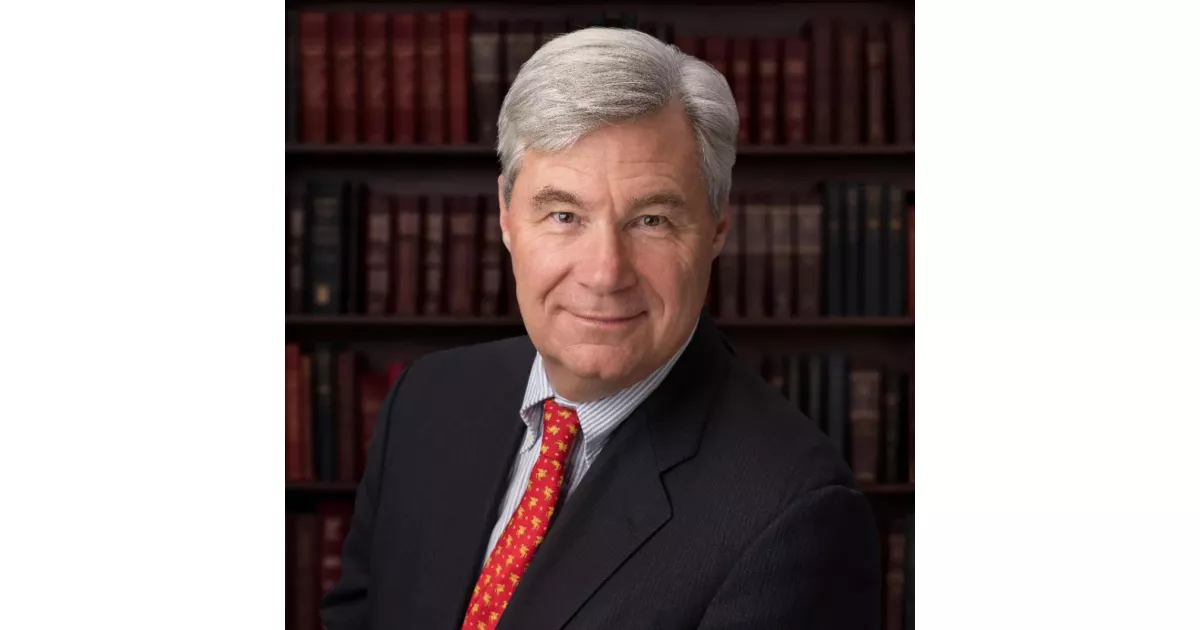Sheldon Whitehouse is a prominent American politician currently serving as the junior United States Senator for Rhode Island since 2007. A Democrat, his career includes serving as U.S. Attorney for Rhode Island (1993-1998) and Rhode Island Attorney General (1999-2003). He entered the Senate after defeating incumbent Lincoln Chafee in 2006 and has been re-elected multiple times since. Whitehouse is known for his advocacy on climate change and campaign finance reform.
October 20, 1955: Sheldon Whitehouse Born
On October 20, 1955, Sheldon Whitehouse was born.
1965: Death of Grandfather Edwin Sheldon Whitehouse
In 1965, Sheldon Whitehouse's grandfather, diplomat Edwin Sheldon Whitehouse, passed away.
1970: Last Democrat to Win Senate Seat Before Whitehouse
In 1970, John Pastore was the last Democrat to win the U.S. Senate seat that Sheldon Whitehouse won in 2006.
1978: Graduated from Yale College
In 1978, Sheldon Whitehouse graduated from Yale College.
1982: Graduated from University of Virginia School of Law
In 1982, Sheldon Whitehouse received his Juris Doctor from the University of Virginia School of Law.
1985: Special Assistant Attorney General
In 1985, Sheldon Whitehouse began working in the Rhode Island Attorney General's office as a special assistant attorney general.
1986: Whitehouse married Sandra Thornton
In 1986, Sheldon Whitehouse married Sandra Thornton, a marine biologist with notable family connections, in Rhode Island. They subsequently had two children, and Whitehouse is Episcopalian.
1988: Chief of the Regulatory Unit
In 1988, Sheldon Whitehouse became the chief of the Regulatory Unit (which oversaw utilities) in the Rhode Island Attorney General's office.
1989: Assistant Attorney General
In 1989, Sheldon Whitehouse also served as an assistant attorney general in the Rhode Island Attorney General's office.
1990: End of Roles in Attorney General's Office
In 1990, Sheldon Whitehouse concluded his roles as special assistant attorney general, chief of the Regulatory Unit, and assistant attorney general in the Rhode Island Attorney General's office.
1991: Executive Counsel to Governor Sundlun
In 1991, Sheldon Whitehouse became the executive counsel to Rhode Island Governor Bruce Sundlun.
1992: Director of Business Regulation
In 1992, Sheldon Whitehouse was appointed as the state's Director of Business Regulation by Governor Sundlun.
1993: Appointed as U.S. Attorney
In 1993, Sheldon Whitehouse became the United States Attorney for the District of Rhode Island.
1994: Appointed U.S. Attorney for Rhode Island
In 1994, President Bill Clinton appointed Sheldon Whitehouse as the United States Attorney for Rhode Island.
1996: Conviction of Mobster Gerard Ouimette
In 1996, Sheldon Whitehouse achieved the first conviction of a member of organized crime under President Clinton's "three strikes law" with the extortion conviction of mobster Gerard Ouimette.
1998: Elected Rhode Island Attorney General
In 1998, Sheldon Whitehouse was elected as the Rhode Island Attorney General.
1998: End of U.S. Attorney Term
In 1998, Sheldon Whitehouse's tenure as the United States Attorney for the District of Rhode Island concluded.
1999: Elected Attorney General of Rhode Island
In 1999, Sheldon Whitehouse was elected as the 71st Attorney General of Rhode Island.
January 2000: Criticism for Not Appointing Independent Prosecutor
In January 2000, Sheldon Whitehouse faced criticism for not appointing an independent prosecutor to investigate the shooting death of African-American police officer Cornel Young Jr. by fellow officers.
2002: Lost Primary Election for Governor
In 2002, Sheldon Whitehouse lost the Democratic primary election for governor of Rhode Island to Myrth York.
2003: End of Term as Attorney General
In 2003, Sheldon Whitehouse's term as the Attorney General of Rhode Island came to an end.
April 4, 2005: Launched Senate Campaign
On April 4, 2005, Sheldon Whitehouse launched his campaign for the U.S. Senate seat held by Lincoln Chafee.
2006: Tom Steyer Donates to Whitehouse
In 2006, Billionaire Tom Steyer started donating directly to Whitehouse's campaign. Whitehouse has received over $175,000 in campaign donations from the League of Conservation Voters. Other donors to Whitehouse include the Sierra Club and the Natural Resources Defense Council.
2006: Elected to the U.S. Senate
In 2006, Sheldon Whitehouse was elected to the U.S. Senate, defeating Republican incumbent Lincoln Chafee.
2007: Became U.S. Senator
In 2007, Sheldon Whitehouse began serving as the junior United States Senator from Rhode Island.
2007: Ranked Second-Most Liberal Senator
In 2007, the National Journal ranked Sheldon Whitehouse as the second-most liberal senator.
2007: Called for Alberto Gonzales's Resignation
In the spring of 2007, Sheldon Whitehouse joined other senators in calling for Attorney General Alberto Gonzales's resignation and questioned his service in the NSA warrantless surveillance controversy.
July 1, 2008: Lead Paint Lawsuit Overturned
On July 1, 2008, the Rhode Island Supreme Court unanimously overturned a decision that found former lead paint manufacturers responsible for creating a public nuisance, stating that property owners are responsible for abating lead hazards.
September 16, 2008: Meeting with Federal Reserve Chairman and Treasury Secretary
On September 16, 2008, Sheldon Whitehouse met with Federal Reserve Chairman Ben Bernanke and Treasury Secretary Henry Paulson and was briefed on the unfolding financial crisis, after which he sold a number of positions.
December 2009: Comments on Obamacare Opponents
In December 2009, Sheldon Whitehouse referred to those who opposed Obamacare as "birthers", "fanatics", and "people running around in right-wing militia and Aryan support groups".
November 2011: Introduced the SAFE Act
In November 2011, Sheldon Whitehouse introduced the Safeguarding America's Future and Environment (SAFE) Act, a bill addressing climate change and natural resource management.
November 6, 2012: Re-elected to Second Term
On November 6, 2012, Sheldon Whitehouse was re-elected to a second term in the U.S. Senate, defeating Barry Hinckley.
2012: Re-elected to the Senate
In 2012, Sheldon Whitehouse was re-elected to the Senate.
2012: Began Weekly Senate Floor Speeches on Climate Change
Since 2012, Sheldon Whitehouse has spoken on the Senate floor about climate change every week the Senate has been in session.
September 2014: Whitehouse signs letter to FDA commissioner
In September 2014, Whitehouse, along with 68 other members of Congress, signed a letter to the FDA commissioner requesting a revision of the policy that bans cornea and tissue donations from men who have had sexual relations with another man within the last five years. He has also publicly supported the reintroduction of the Equal Rights Amendment.
September 2014: Speculation as Potential Attorney General Nominee
In September 2014, following Attorney General Eric Holder's announcement to step down, there was speculation that Sheldon Whitehouse could be nominated as his replacement.
May 29, 2015: Advocated Prosecution of Fossil Fuel Industry
On May 29, 2015, in a Washington Post editorial, Sheldon Whitehouse advocated prosecution of members of the fossil fuel industry under the Racketeer Influenced and Corrupt Organizations Act (RICO).
February 2016: Possible Supreme Court Nominee
In February 2016, after the death of Justice Antonin Scalia, USA Today named Sheldon Whitehouse as a possible nominee to fill the Supreme Court vacancy; however, he was not ultimately nominated.
November 6, 2018: Re-elected to Third Term
On November 6, 2018, Sheldon Whitehouse was re-elected to a third term in the U.S. Senate, defeating Robert Flanders.
2018: Re-elected to the Senate
In 2018, Sheldon Whitehouse was re-elected to the U.S. Senate for a third term.
2018: Expressed Opposition to D.C. Statehood
In a 2018 interview with the Providence Journal, Sheldon Whitehouse expressed opposition to D.C. statehood.
April 2019: Signed Bipartisan Letter for Energy Department Funding
In April 2019, Sheldon Whitehouse was one of 12 senators to sign a bipartisan letter advocating maximum funding for carbon capture, utilization and storage (CCUS) for the Energy Department.
July 24, 2019: 250th Climate Change Speech
On July 24, 2019, Sheldon Whitehouse gave his 250th speech on the Senate floor about climate change.
2019: John Rothman portrayed Whitehouse in The Report
In 2019, John Rothman played the role of Sheldon Whitehouse in the movie, The Report.
2019: Whitehouse to introduce legislation on amicus briefs
In 2019, Whitehouse announced his intention to introduce legislation requiring groups filing amicus curiae briefs with the U.S. Supreme Court to disclose their donors.
July 2020: Cosponsored Senate Bill for D.C. Statehood
In July 2020, Sheldon Whitehouse cosponsored a Senate bill to grant D.C. statehood.
2020: Disagreement with President Trump's Budget Request
In 2020, Sheldon Whitehouse expressed disagreement with President Trump's budget request to combine the two federal programs that do carbon capture research.
March 2021: Whitehouse asks Garland to investigate Kavanaugh
Also in March 2021, Whitehouse sent a letter to U.S. Attorney General Merrick Garland requesting an investigation into what he described as a potentially politically influenced and fake FBI investigation into alleged misconduct by then-Supreme Court Justice Brett Kavanaugh.
March 2021: Whitehouse convenes hearing on Supreme Court
In March 2021, Whitehouse convened a Senate Judiciary subcommittee hearing titled "What's Wrong with the Supreme Court: The Big-Money Assault on Our Judiciary". He alleged that a "multi-hundred million dollar covert operation" influences the U.S. Supreme Court.
June 2021: Whitehouse defends family's Bailey's Beach membership
In June 2021, Whitehouse defended his family's membership in the elite private club Bailey's Beach, amidst scrutiny over its alleged all-white membership and exclusivity. He stated that the club was working on diversifying its membership and that his family's involvement was aimed at pushing for improvements, declining to ask them to resign.
March 2022: Reported STOCK Act Violation
In March 2022, Business Insider reported that Sheldon Whitehouse had violated the STOCK Act by failing to disclose two personal stock purchases by the federal deadline. The stocks in question were for the Target Corporation and Tesla, Inc.
September 2022: Report on Stock Trading
In September 2022, a New York Times investigation found that Sheldon Whitehouse was among the members of Congress who had bought or sold stock that intersected with his congressional work.
2022: Voted for Bipartisan Safer Communities Act
In 2022, Sheldon Whitehouse voted for the Bipartisan Safer Communities Act, a gun reform bill.
2023: Chair of the Senate Budget Committee
In 2023, Sheldon Whitehouse became the chair of the United States Senate Committee on the Budget.
July 9, 2024: Whitehouse requests special prosecutor for Clarence Thomas
On July 9, 2024, it was reported that the previous week Whitehouse and Senator Ron Wyden sent a letter to Attorney General Merrick Garland requesting the appointment of a special prosecutor to investigate Supreme Court Justice Clarence Thomas for potential tax and ethics violations.
July 2024: Authored Legislation to Prohibit Octopus Farming
In July 2024, Sheldon Whitehouse authored legislation to prohibit the commercial farming of octopuses nationwide, citing environmental and animal welfare concerns.
August 2024: Comments on Supreme Court Reform Bill
In August 2024, Sheldon Whitehouse said that if Democrats won control of the White House, Senate, and House of Representatives in the 2024 elections, they would be "virtually certain" to pass a Supreme Court reform bill including term limits and ethics rules.
November 5, 2024: Re-elected to Fourth Term
On November 5, 2024, Sheldon Whitehouse was re-elected to a fourth term in the U.S. Senate, defeating Patricia Morgan.
2024: Re-elected to the Senate
In 2024, Sheldon Whitehouse was re-elected to the U.S. Senate for a fourth term.
January 2025: Whitehouse considers voting to confirm Robert F. Kennedy Jr.
In January 2025, Whitehouse reportedly considered voting to confirm Robert F. Kennedy Jr., Trump's nominee for Secretary of HHS, citing a lifelong friendship and Rhode Island's healthcare needs. However, during Kennedy's confirmation hearing on January 29, Whitehouse supported mandatory vaccinations, ultimately voting against Kennedy's confirmation.
February 2025: Ethics Complaint Filed
In February 2025, the Foundation for Accountability and Civic Trust filed an ethics complaint accusing Sheldon Whitehouse of violating ethics policies by advocating for legislation to award his wife's nonprofit, Ocean Conservancy, $7 million in federal funding.
2025: Reintroduced Legislation to Prohibit Octopus Farming
In 2025, Sheldon Whitehouse reintroduced the legislation to prohibit commercial octopus farming.
Mentioned in this timeline

Bill Clinton served as the nd U S President from...

Merrick Garland is an American lawyer and jurist He served...
Iraq officially the Republic of Iraq is a West Asian...

Brett Kavanaugh is an American lawyer and jurist who currently...
Virginia a state in the Southeastern and Mid-Atlantic US lies...

War is defined as an armed conflict involving the armed...
Trending

22 minutes ago Ex-Advisor Convicted of Defrauding Jrue Holiday and Other NBA Players

23 minutes ago Jalen Johnson injured in first quarter, Hawks win; questionable for Blazers game.

8 days ago Jonathan Kuminga Expected to Debut for Hawks Against Wizards, Frustrating Warriors Fans.

1 hour ago Donovan Clingan Ejected After Flagrant Foul During Blazers vs Grizzlies Game

1 hour ago Derrick White wins Eastern Conference Defensive Player of the Month for Celtics.

1 hour ago OG Anunoby's character revealed and scores 21 points against the Milwaukee Bucks.
Popular

Ken Paxton is an American politician and lawyer serving as...

Hillary Diane Rodham Clinton is a prominent American politician lawyer...

Jesse Jackson is an American civil rights activist politician and...

Jim Carrey is a Canadian-American actor and comedian celebrated for...

Bill Clinton served as the nd U S President from...

XXXTentacion born Jahseh Dwayne Ricardo Onfroy was a controversial yet...
